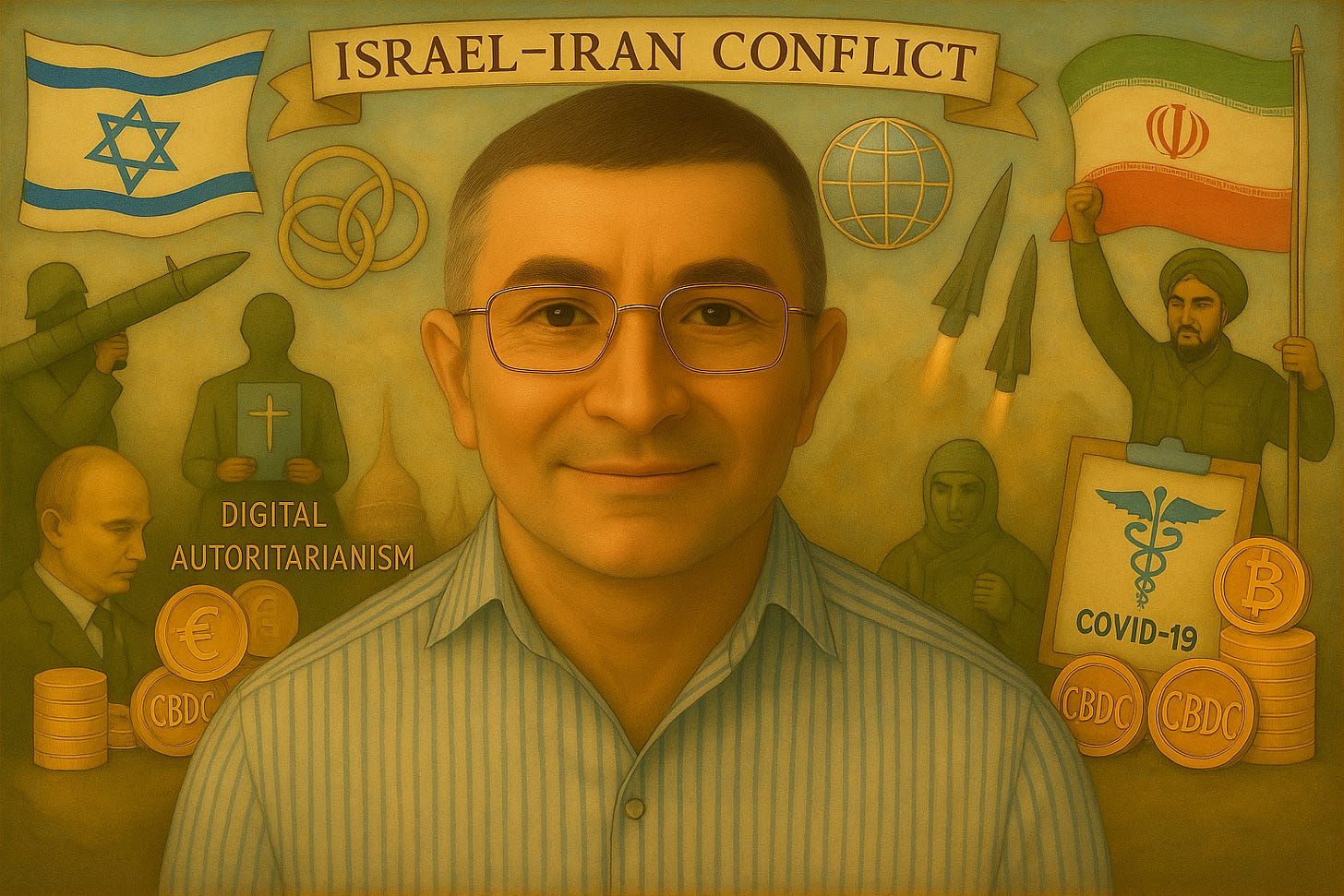UPDATE: “Dear friends,
a regrettable error has occurred. The text that I published on my Telegram channel and which concerns the Israeli-Iranian war does not belong to me. I simply reproduced it because I found it interesting. It is taken from the Telegram channel FCKCBDC.
Some of my friends have already translated it into high languages and presented it as my text. I apologize for this confusion."
- Yuri Rosca
NB! However, Rosca agrees with the points made in the article!
Freedom activist Yuri Roșca, former member of parliament and deputy prime minister of Moldova, presents Iran and Israel as false opposites.
INTRO
Briefly about Rosca: Former Moldovan politician Iurie Roșca recounts how he was forced, several times in his life, to undergo a paradigm shift in order to reach his current level of awareness (e.g., anti-communist, anti-imperialist, anti-globalist). He discovered how the collective West attempted to alter family and social values – even Moldova’s national constitution – through economic imperialism. He has been politically “assassinated” (figuratively), is persona non grata in Romania, and his website was shut down by the Moldovan intelligence services. Originally a supporter of the Kremlin Collective, he collaborated personally with Alexander Dugin, but serious doubts began to emerge.
Rosca’s position is clear here:
“….propagandists like Pepe Escobar, Douglas Macgregor, Scott Ritter, and Alexander Dugin are all seeking to mislead the millions of people who have become understandably disgusted with American imperialism, with NATO, and with Russia, the EU and other globalist organizations―misleading them by inculcating the myth of a rebel Kremlin and the legend of an anti-System BRICS.
It's incredible to watch as some alternative media giants like Alex Jones, Tucker Carlson and Joe Rogan tell us how Trump and Putin are fighting globalists and evil democrats to make all of humanity happy and great again.
– excerpt from Iurie Roșca's take on Alexander Dugin
The greatest shock came in 2020 with the Covid operation, where it became clear that there is only one global center of real power.
Rosca is a Third Narrativist (my term), like Mees Baaijens, Paul Cudenec, Iain Davis, James Corbett, David A. Hughes, Brendon O’Connell, and others. I’ve been in contact with several of them (except David A. Hughes and Iain Davis).
YURI ROSCA, 24th of June 2025 (Telegram):
The Israel-Iran conflict operates as a controlled geopolitical spectacle, serving multiple systemic functions for regional and global power structures. It sustains the perpetual conflict model necessary for arms industries, geopolitical alignment strategies, and domestic regime consolidation on both sides. Far from being purely adversarial, the conflict functions symbiotically.
Controlled Escalation Doctrine: Both Israel and Iran engage in limited, symbolic strikes calibrated not to provoke full-scale war. Theatrical missile exchanges, calibrated retaliations, and public posturing maintain a continuous narrative of conflict without destabilizing systemic balances.
Regime Legitimacy Maintenance: Iran uses Israel as an external enemy for regime legitimacy, mobilizing nationalism, deflecting from internal repression, and uniting divergent factions. Israel reciprocates by positioning Iran as the perpetual existential threat, sustaining domestic cohesion and foreign policy leverage, especially with U.S. backing.
Globalist System Integration: Both regimes benefit from the perpetual crisis narrative to justify technological modernization, military spending, and integration with global surveillance and control frameworks.
Iran’s Complicity in Globalist Agendas:
CBDCs (Crypto Rial): Iran’s adoption of a retail CBDC mirrors global financial digitization efforts aimed at comprehensive monetary surveillance, control, and eventual integration into emerging transnational digital financial systems.
Digital Authoritarianism: Iran’s internal surveillance state, digital censorship architecture, and population control mechanisms directly align with globalist strategies of technological containment and behavioral governance.
Public Health Governance (COVID-19): Iran followed WHO-aligned pandemic protocols, enforcing lockdowns, vaccination campaigns, and digital health monitoring, revealing compliance with global crisis governance structures.
Multipolar Globalist Alignment: While rhetorically anti-Western, Iran’s alliances with China, Russia, and BRICS initiatives demonstrate convergence with a multipolar variant of globalism rather than resistance to globalist frameworks themselves. These alliances also promote CBDCs, digital IDs, AI governance, and climate control architectures in their respective spheres.
Energy Market Manipulation: Iran’s role in OPEC+, engagement in energy price management, and controlled antagonism in the Strait of Hormuz contribute to global market stability/disruption cycles, a tool leveraged by global financial systems.
The Israel-Iran conflict is theater designed to serve both domestic legitimacy needs and globalist structural imperatives. Iran’s leadership is fully complicit in the operational architecture of globalist agendas. Its anti-globalist rhetoric serves as a domestic psychological operation, masking deep integration into emergent global governance systems. The apparent opposition is dialectical, sustaining both sides while reinforcing systemic global control.





